We asked a career expert to build the perfect resume. Here's a template you can use to update your CV and land a dream job.
Áine Cain,Shayanne Gal,Allana Akhtar

- Using a sample resume to help you spruce up your own doesn't mean it has to be bland.
- Business Insider and career expert Amanda Augustine put together a strong sample resume as inspiration for job seekers.
A good resume can be hard to find — so here's a solid sample resume to help you get started.
After all, your resume is your key to new and exciting job opportunities.
Business Insider and Amanda Augustine — a career expert and spokesperson at TopResume — put together the following resume for all current and future job seekers.
While resumes should be tailored to the industry you're in, the one below offers a helpful guide for entry- and mid-level professionals with three to five years of relevant work experience.
Follow these tips to make the perfect resume:
Include a URL to your professional online profile.
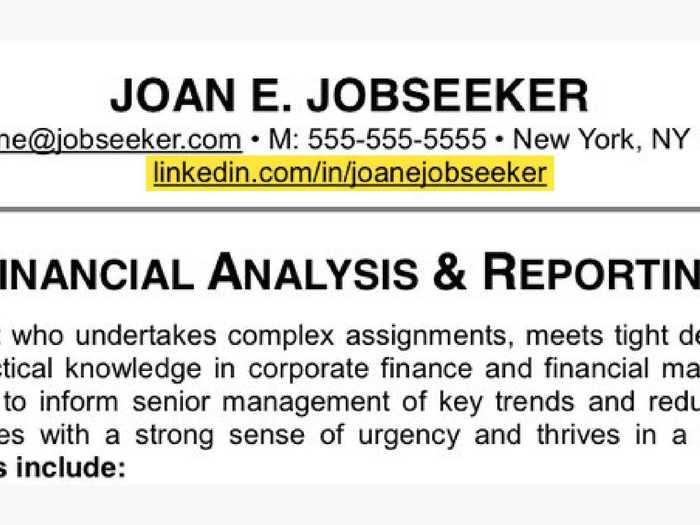
If you don't include URLs to your professional online profiles, hiring managers will look you up regardless.
Why not include your URL along with your contact information? This will prevent recruiters from having to guess or mistaking you for someone else.
Use consistent branding.
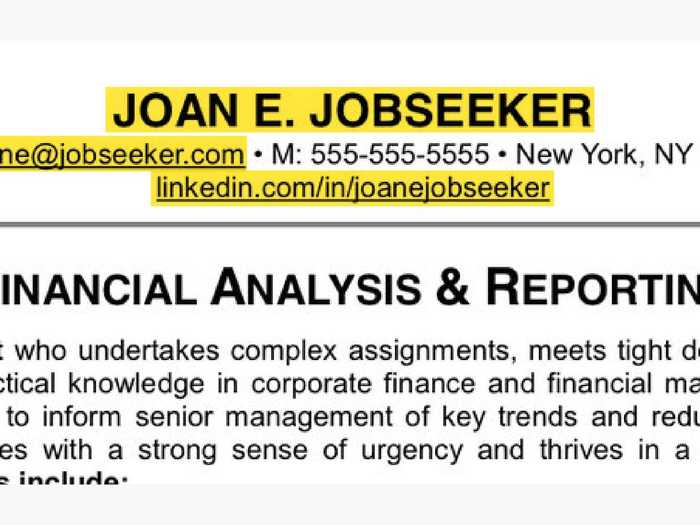
"If you have a common name, consider including your middle initial on your résumé and online professional profiles to differentiate yourself from the competition," said Augustine.
For example, decide if you're Mike Johnson, Michael Johnson, or Mike E. Johnson. Then use this name consistently, be it on LinkedIn, Google+, Twitter, or Facebook.
Include a single phone number and email address.
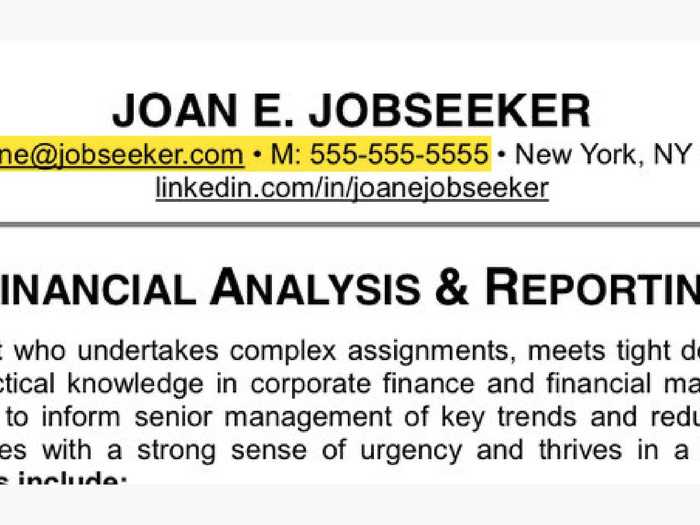
"Choose one phone number for your résumé where you control the voicemail message and who picks up the phone," Augustine said.
The same rule applies to an email address.
Include an executive summary instead of an objective statement.
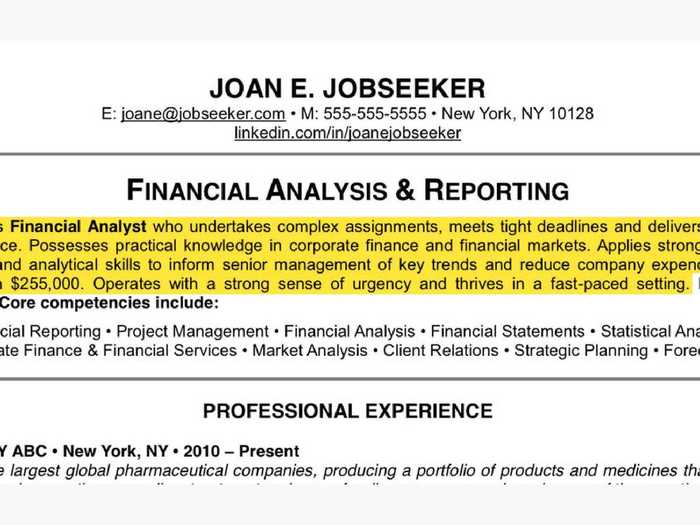
There's no point in including a generic objective about a "professional looking for opportunities that will allow me to leverage my skills," said Augustine.
It's not helpful and distracting. Ditch it.
Replace your fluffy statement with an executive summary, which should be like a "30-second elevator pitch" where you explain who you are and what you're looking for.
"In approximately three to five sentences, explain what you're great at, most interested in, and how you can provide value to a prospective employer," Augustine said.
Use reverse chronological order.
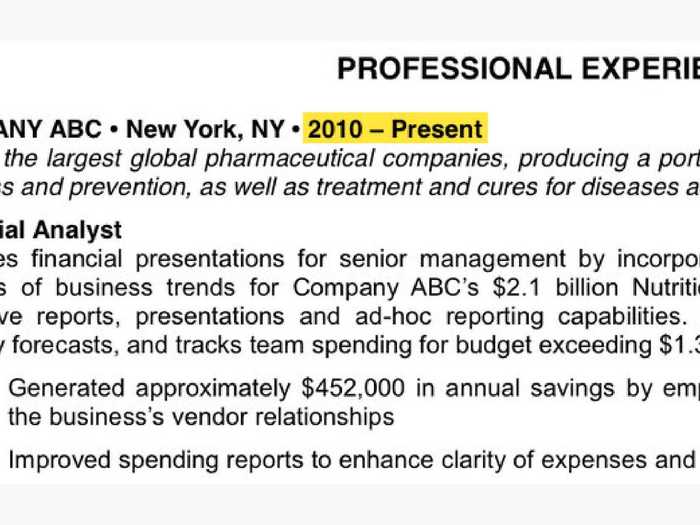
This is the most helpful for recruiters because they're able to see what you've been doing in recent years immediately, said Augustine.
"The only time you shouldn't do this is if you're trying to transition to another career altogether, but then again, in this situation, you'll probably be relying more on networks," than your résumé, she said.
Use keywords like 'forecasting' and 'strategic planning.'
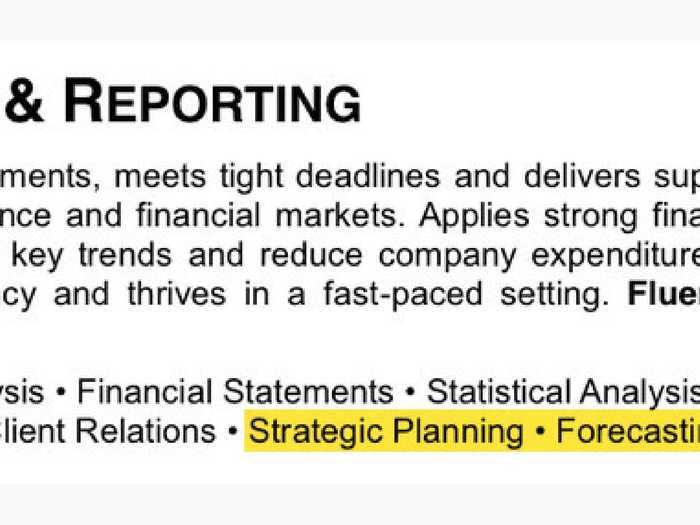
Many companies use some kind of screening process to identify the right candidates. You should include the keywords mentioned in the job posting throughout your résumé.
"Identify the common keywords, terminology, and key phrases that routinely pop up in the job descriptions of your target role and incorporate them into your résumé (assuming you have those skills)," said Augustine. "This will help you make it past the initial screenings and on to the recruiter or hiring manager."
Provide company descriptions.
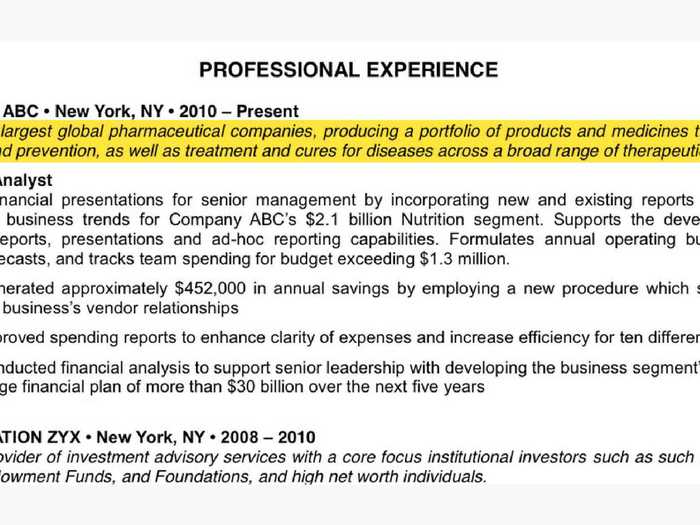
It's helpful for recruiters to know the size of the company you used to work for, said Augustine.
"Being a director of a huge company means something very different than a director at a small company," she said.
You can go to the company's "About Us" section and rewrite one or two lines of the description. This should be included right underneath the name of the company.
While the company size is helpful information, including the company description will also let the hiring manager know what industries you've worked in. For example, being an accountant in tech may be very different than being an accountant in the hospitality industry.
"As with most things on a résumé, the company description should be tailored based on the professional's goals," she said. "If you're looking to switch industries, your focus may be on the company size — assuming it's similar to your goals — and less on discussing the various products your company sells."
Do not list achievements in dense blocks of text.
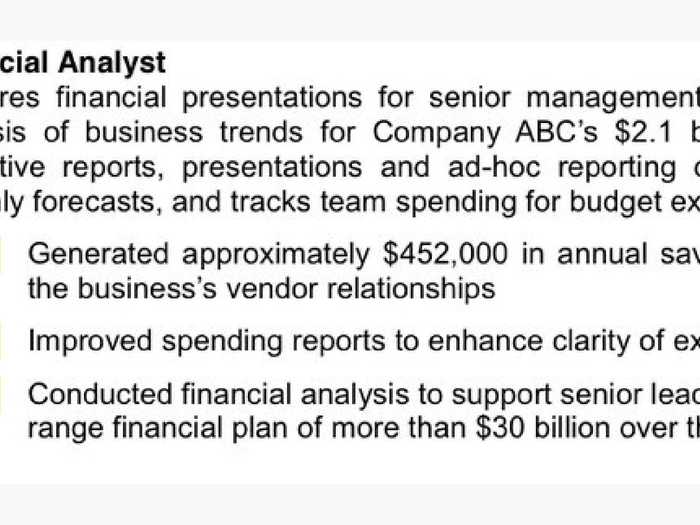
Recruiters receive so many résumés to scan through at a time, so make it as easy as possible for them to understand why you're perfect for the job. Dense blocks of text are too difficult to read, said Augustine.
Under each job or experience you've had, explain how you contributed to or supported your team's projects and initiatives.
"As you build up your experience, save the bullets for your bragging points," said Augustine.
Quantify your achievements.
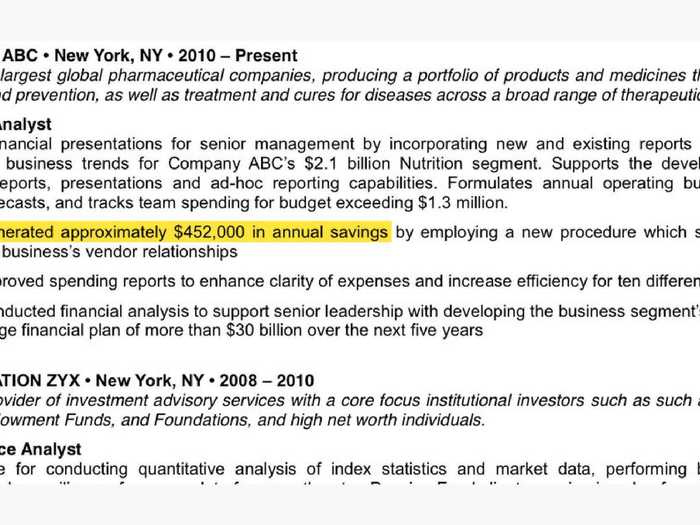
"Quantify your major accomplishments and contributions for each role," Augustine told us.
This can include the money you saved or brought in for your employer, deals closed, and projects delivered on time or under budget. Do not use any more than three to five bullet points.
Format your Accomplishment as result-and-then-cause.
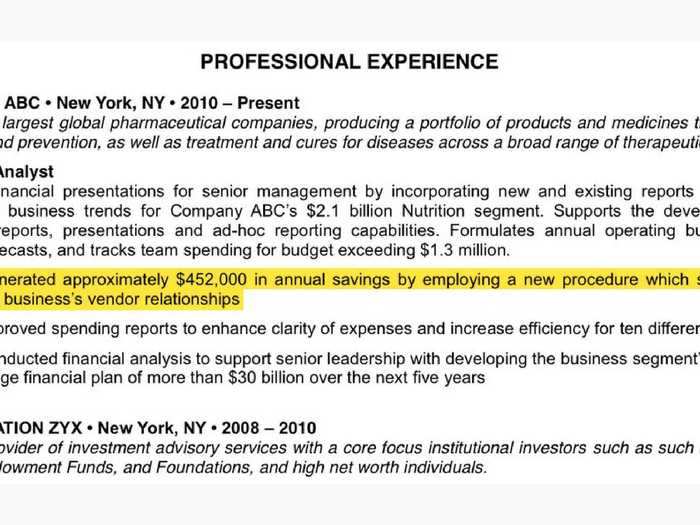
A good rule is to use the "result BY action" sentence structure whenever possible. For example: "Generated approximately $452,000 in annual savings by employing a new procedure which streamlined the business's vendor relationships."
Use white space to draw the reader's eyes to important points.
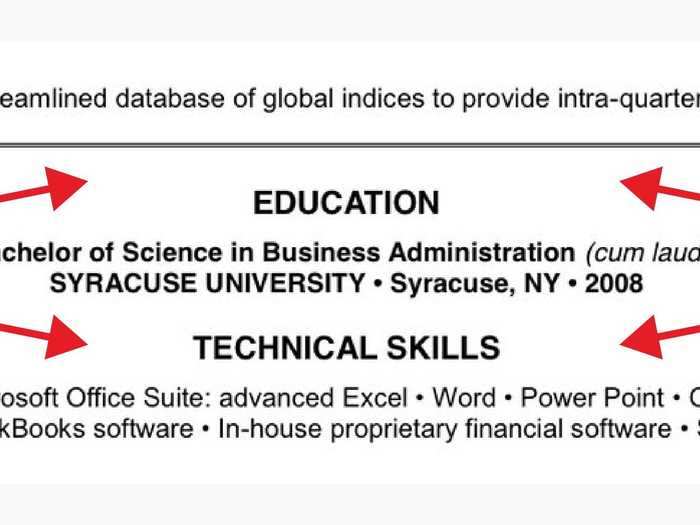
Recruiters do not spend a lot of time scanning résumés, so avoid dense blocks of text.
"The key is to format the information in a way that makes it easy to scan and recognize your job goals and relevant qualifications," Augustine told us.
Don't use crazy fonts or colors.
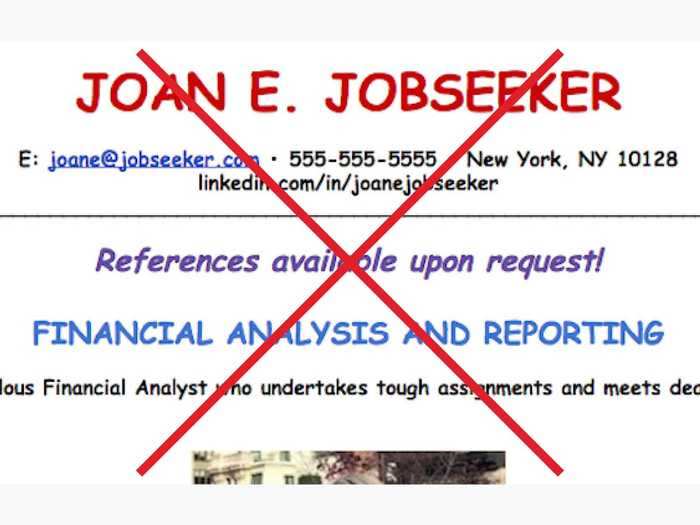
"Stick to black and white color," said Augustine. As for font, it's best to stick with the basics, such as Arial, Tahoma, or Calibri.
Do not include pronouns.
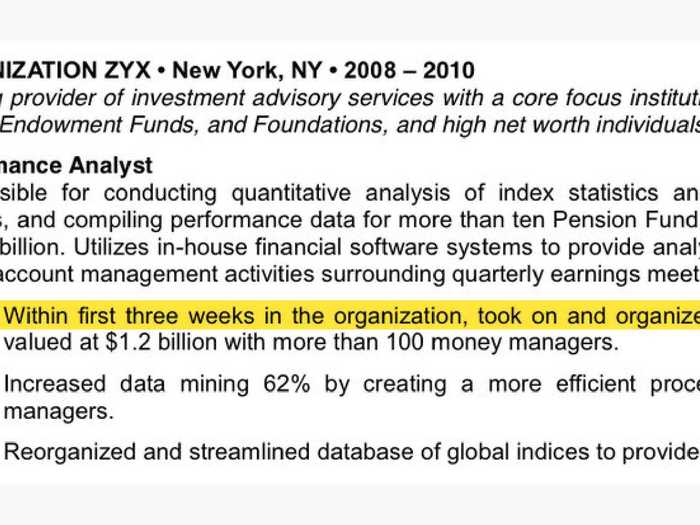
Augustine says you should never write your résumé in third person because everyone knows you're the one writing it (unless you go through a professional resume writing service).
Instead, you should write it in first person, but do not include pronouns. "It's weird to include pronouns, and it's an extra word you don't need," she said. "You need to streamline your résumé because you have limited real estate."
Do not include images.
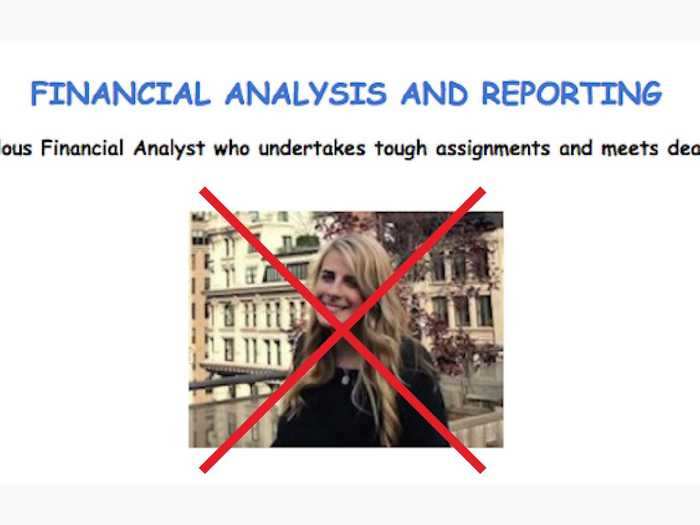
"Avoid adding any embedded tables, pictures, or other images in your résumé, as this can confuse the applicant-tracking software and jumble your résumé in the system," said Augustine.
Do not use headers or footers.
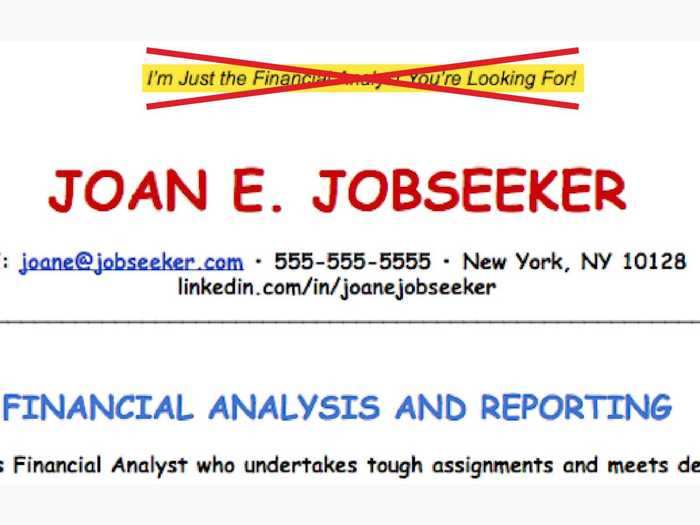
It may look neat and concise to display your contact information in the header, but for "the same reason with embedded tables and charts, it often gets scrambled in an applicant tracking system," said Augustine.
List education at the bottom.
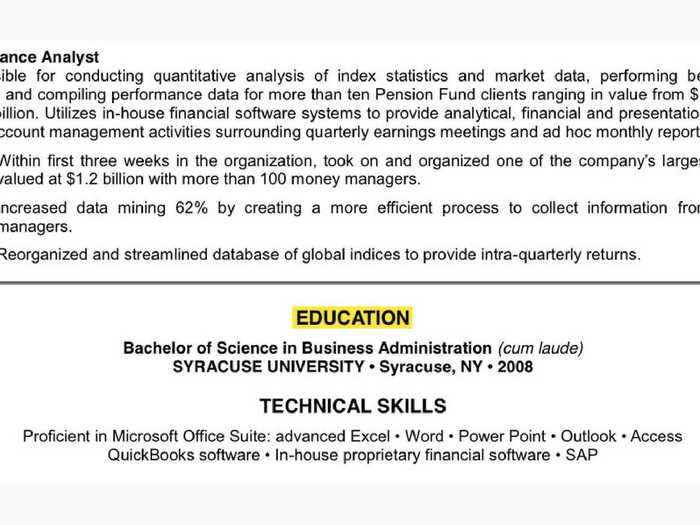
Unless you're a recent graduate, you should highlight your work experience and move your education information to the bottom of your résumé, said Augustine.
Never include anything about your high-school years.
Don't say 'references upon request.'
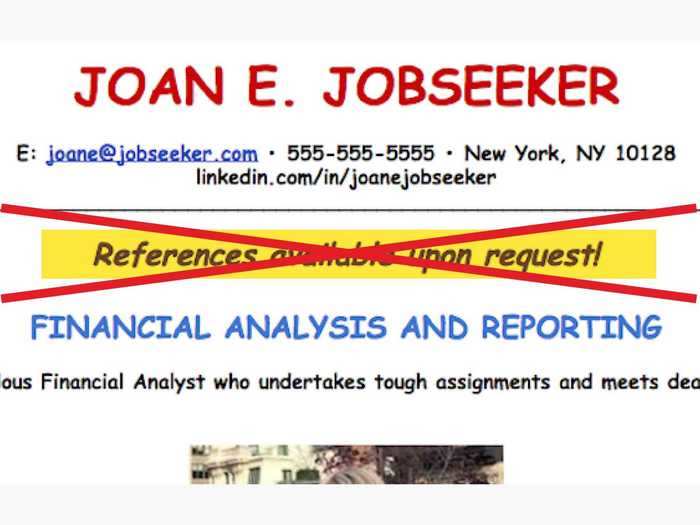
Every recruiter knows you're going to provide references if they request it so there's no reason for you to include this line.
Again, remember that space on your résumé is crucial so don't waste it on a meaningless line, Augustine told us.
Vivian Giang wrote a previous version of this article.
READ MORE ARTICLES ON
Popular Right Now
Advertisement